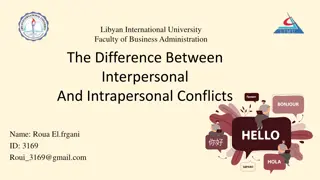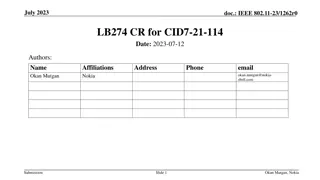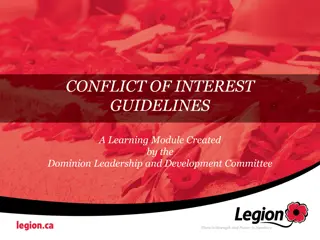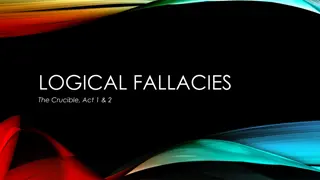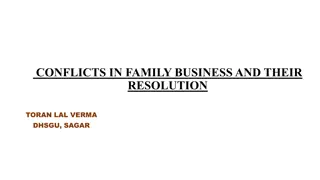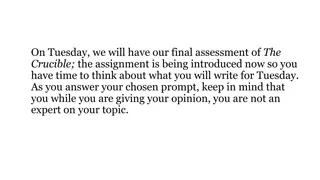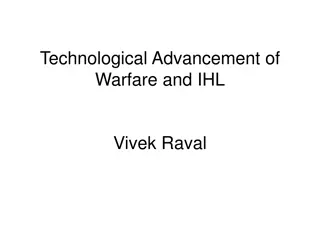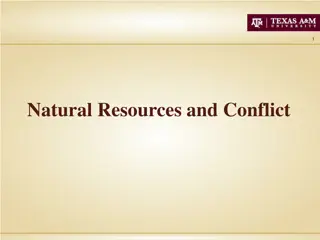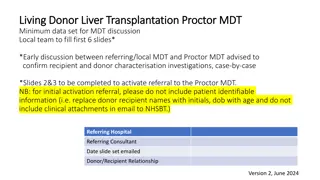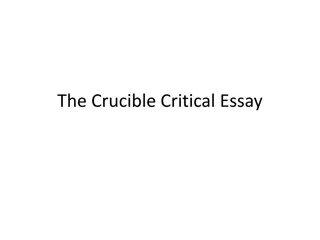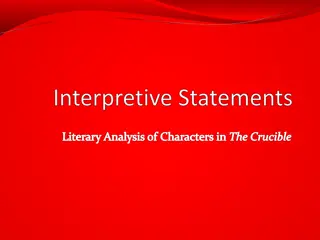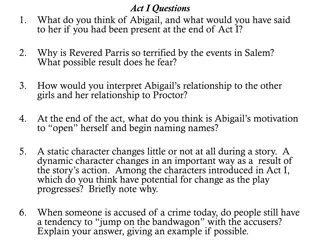John Proctor's Conflicts in "The Crucible
John Proctor in "The Crucible" faces conflicts with Abigail Williams, his society in Salem, and his inner demons due to his adultery. These conflicts drive the plot and showcase the struggle between personal integrity and societal expectations in a strict theocracy. Proctor's internal turmoil over his reputation and guilt adds complexity to his character as he navigates the harsh realities of 1692 Salem.
Download Presentation

Please find below an Image/Link to download the presentation.
The content on the website is provided AS IS for your information and personal use only. It may not be sold, licensed, or shared on other websites without obtaining consent from the author.If you encounter any issues during the download, it is possible that the publisher has removed the file from their server.
You are allowed to download the files provided on this website for personal or commercial use, subject to the condition that they are used lawfully. All files are the property of their respective owners.
The content on the website is provided AS IS for your information and personal use only. It may not be sold, licensed, or shared on other websites without obtaining consent from the author.
E N D
Presentation Transcript
John Proctors conflicts John Proctor s conflicts
John Proctor experiences a number of different types of conflict in the play: 1. He is in conflict with Abigail Williams 2. He is in conflict with his society 3. He is in conflict with himself (inner conflict)
1. Proctors conflict with Abigail Williams 1. Proctor s conflict with Abigail Williams This conflict can be seen in different parts of the play: When Proctor rejects Abigail s advances and makes it clear that their affair is over and done with (Act 1) When Abigail, out of jealousy, falsely accuses Proctor s wife Elizabeth of witchcraft so that she can take her place (Act 2) When Proctor goes to court with Mary in order to convince Danforth that Abigail is a fraud (Act 3)
2. Proctors conflict with his society 2. Proctor s conflict with his society Salem in 1692 is a very strict theocracy where everyone is a Puritan and is expected to live their lives according to the Bible and follow the Ten Commandments. If anyone is discovered breaking any of these commandments, or not living as a good Christian, then they are severely punished and treated with great suspicion. However, Proctor has committed adultery with Abigail Williams while she worked for him as a servant at his farm. This is a very serious sin. This puts him into conflict with his society: Adultery is a serious crime in a Puritan society such as Salem, and Proctor would be severely punished if it was ever discovered. His reputation would be in ruins and he would possibly lose his land and be banished from the village. This is why he is so determined to keep the affair a secret: to protect his all-important reputation and avoid punishment.
3. Proctors inner conflict 3. Proctor s inner conflict Proctor experiences profound inner conflict at a number of important points in the play. These inner conflicts have a huge impact on the decisions that he makes.
Inner conflict 1 Proctor greatly values and is obsessed with his strong reputation in Salem, but he feels like he does not deserve it due to his adultery. He is determined to redeem himself for his sins and thus truly deserve his reputation. He is deeply ashamed, hates himself and feels like a fraud and a hypocrite due to the affair but does not want to lose his reputation and he is determined to maintain and protect it. (Act 1)
Inner conflict 2 Abigail told Proctor in private that she and the other girls were only playing in the woods and that there was no witchcraft involved. Therefore, Proctor has important information which he knows could stop the witch-hunt in Salem. However, Proctor keeps this information to himself for over a week as he is not willing to go to court and risk the affair being exposed in order to expose Abigail as a fraud. He is not willing to jeopardise his all-important reputation. (Act 2)
Inner conflict 3 When Elizabeth is arrested, Proctor finally realises that he must take action in order to prevent her from being hanged as a witch. He knows that he must go to court in order to denounce Abigail. However, instead of informing Danforth what Abigail had told him, Proctor relies on the testimony of Mary. He thinks that he can prove Abigail to be false without having to reveal anything about the affair. He tries to use Mary to bring down Abigail so that he can protect and maintain his all- important reputation. (Act 3)
Inner conflict 4 Proctor s attempts to use Mary s testimony to expose Abigail s lies and deceit have failed. Although he is desperate to protect his reputation, Proctor realises that he has no option but to reveal the affair to Danforth so that he can see that Abigail s accusations about Elizabeth are motivated by jealousy. He is forced to sacrifice his reputation in order to save Elizabeth and the other innocent people accused by Abigail. (Act 3)
Inner conflict 5 In Act 4, Proctor is given the opportunity to confess to witchcraft and he is, therefore, faced with a huge dilemma: If he signs the confession he will be falsely admitting to being a witch and he will forever be known as having being in league with the Devil. As a result, his life would be spared but his strong reputation would be completely ruined and he would live the rest of his life in shame and humiliation. If he refuses to sign the confession, he will be executed by hanging but will die with dignity with his strong reputation in tact. Whatever he chooses to do, both decisions have very dire consequences for Proctor. Importantly, he chooses to die rather than to confess to being a witch. (Act 4)



